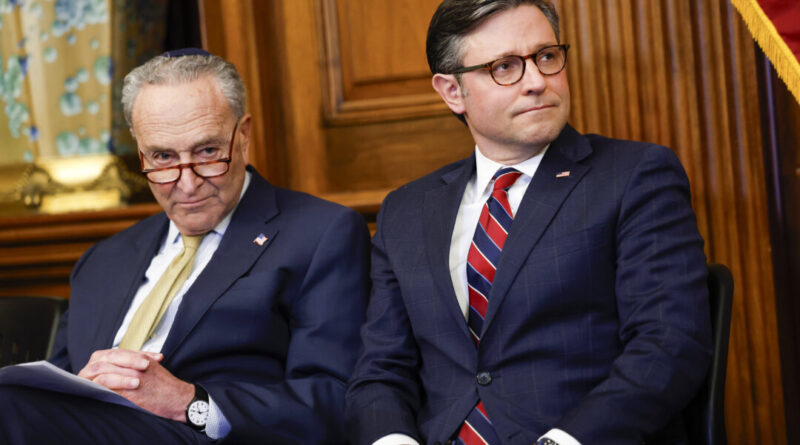Inside the Government Funding Agreement: Key Details Revealed
The extensive legislation encompasses disaster relief assistance, reforms in pharmacy benefit management, and an increase in congressional salaries.
Congress is facing a deadline of two days to secure government funding beyond the expiration date of December 20 and prevent a shutdown.
Rep. Thomas Massie (R-Ky.) was not among those surprised.
“I’m often referred to as ‘NostraThomas’ for accurately predicting that @SpeakerJohnson would utilize the Christmas recess to push through a significant spending bill in Congress,” Massie remarked in a post on social media platform X.
“Despite earlier assertions, Johnson is following a long-standing DC tradition that is almost as old as the act of decorating Christmas trees.”
When Johnson assumed leadership last year, he assured his Republican peers that he would end the practice of governing through large omnibus spending packages.
The legislation maintains current funding levels until March 14, while also adding provisions for disaster relief, support for farmers, a raise in congressional salaries, and additional elements.
The undertaking further introduces significant changes aimed at pharmacy benefit managers, who serve as middlemen in negotiating drug prices.
Below is a summary of some key elements of the bill:
Disaster Relief
A major aspect of the recent spending discussions has been disaster assistance, particularly for those in the Southeast still recovering from Hurricanes Helene and Milton.
The appropriations in the bill align with that request, providing around $100 billion for disaster support. This package includes $29 billion for the Federal Emergency Management Agency’s Disaster Relief Fund, $21 billion for farmers suffering from disaster-related losses, and an additional $10 billion in economic assistance for agriculture.
Farm Bill Extension
This spending agreement extends the authorization of the 2018 Farm Bill for another year, which funds various initiatives and aid programs for farmers.
This provision was added after efforts to pass a longer reauthorization of the bill fell short upon its expiration last year. The new authorization will be valid until the end of fiscal year 2025.
Regulating Drug Middlemen
Pharmacy benefit managers (PBMs) serve as intermediaries negotiating drug prices with manufacturers on behalf of health insurers. They determine which medications will be covered by health plans and manage the payment of drug claims.
Legislators have sought for years to implement reforms concerning the practices of these intermediaries, which some argue have led to artificially inflated prescription prices.
The temporary spending bill mandates that PBMs provide detailed pricing reports to health insurers regarding their negotiations and any received rebates, fees, or discounts. Additionally, these rebates must now be passed on to the health plan or insurance provider.
The provisions would revise the payment structure for how Medicaid compensates PBMs, switching to a flat fee format. The bill also prohibits the spread pricing practice, wherein PBMs keep the difference between the amount paid to pharmacies for medications and the amount billed to Medicaid.
Baltimore Bridge Reconstruction
The legislation also commits federal resources to fully fund the reconstruction of Baltimore’s Francis Scott Key Bridge.
The total cost for this project remains unclear, but the Maryland Transportation Authority estimates it to be between $1.7 billion and $1.9 billion.
The bridge collapsed in March following a cargo ship’s collision with one of its support columns, resulting in the fatalities of six construction workers.
Deepfake Pornography Prohibition
Another significant addition is the TAKE IT DOWN Act, which unanimously passed the Senate earlier this month.
This legislation would criminalize the unauthorized distribution of pornographic materials, including AI-generated images of identifiable individuals.
The widespread bipartisan endorsement might enhance the likelihood of the spending bill passing.
“This initiative is about securing a safer future, addressing challenges posed by the contemporary landscape, rather than ignoring them,” Sen. Amy Klobuchar (D-Minn.), one of the bill’s advocates, stated during a press conference on December 11.
“By enacting this legislation, we can prevent more Americans from experiencing major disruptions in their lives, protect children from losing their innocence, and ensure that victims can pursue the justice they rightfully deserve.”
Increases in Compensation and Benefits
A notable omission from the temporary funding bill is any provision for a cost-of-living adjustment (COLA) wage increase for congressional members.
Since 2009, the base salary for federal legislators has remained $174,000. Each year since then, funding legislation has included provisions preventing these members from receiving annual pay raises.
The continuing resolution also eliminates the current requirement for congressional members to obtain their health insurance through the Affordable Care Act marketplace.
This adjustment would enable lawmakers to revert to the Federal Employee Health Benefits program, which is often deemed as providing superior benefits. Meanwhile, congressional staffers would still be mandated to acquire their insurance through the ACA marketplace.
Rep. Jared Golden (D-Maine), a prominent opponent of raising congressional compensation, criticized the attempt to incorporate these changes into the continuing resolution.
“Our focus should be on increasing wages for Americans and reducing healthcare costs, not quietly inserting new taxpayer-funded benefits for ourselves into essential legislation behind closed doors. While raises and new healthcare advantages for members remain in the CR, I will oppose it,” Golden posted on X.
Reuters contributed to this report.



